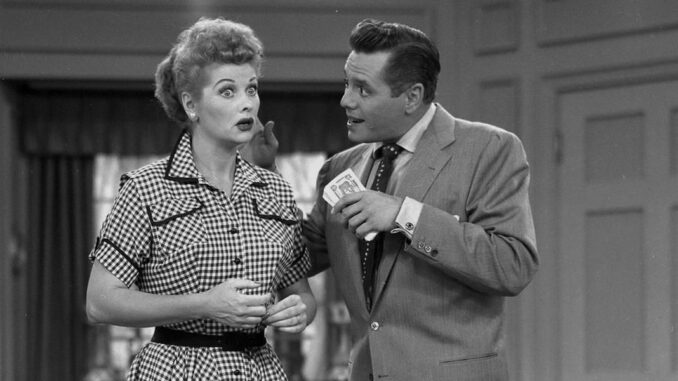
Introduction: Setting the Stage for the Real Lucille Ball
Lucille Ball is a household name, thanks largely to the timeless sitcom I Love Lucy. So, when Nicole Kidman stepped into Ball’s shoes for the biopic Being the Ricardos, fans expected a nostalgic journey filled with classic slapstick moments and iconic catchphrases. But here’s the twist—this film isn’t what you think. Instead of focusing on I Love Lucy, it zooms in on Lucille Ball’s real life and career challenges. Intrigued? Let’s break down why the biopic takes this unexpected path.
The Spotlight Shifts: A Biopic About Lucille, Not Lucy
H1: The Real Lucille Ball: More Than a Sitcom Star
Lucille Ball wasn’t just a funny lady on TV. She was a powerhouse—an actress, producer, and trailblazer in Hollywood. While I Love Lucy put her on the map, the biopic aims to show a side of Ball that most fans haven’t seen.
H2: Being the Ricardos: A Peek Behind the Curtain
The biopic focuses on one crucial week in Ball and Desi Arnaz’s lives, exploring their tumultuous marriage, professional struggles, and personal triumphs. It’s not about sitcom hijinks; it’s about the blood, sweat, and tears behind the laughter.
H3: Nicole Kidman’s Transformation into Lucille Ball
Kidman underwent intense preparation to embody Ball, from perfecting her voice to mimicking her mannerisms. But rather than recreating iconic episodes, Kidman channels Ball’s off-screen persona—fierce, vulnerable, and determined.
Why I Love Lucy Takes a Backseat
H1: Avoiding a Predictable Narrative
Let’s face it: we’ve all seen reruns of I Love Lucy. By sidestepping the sitcom, the biopic avoids retreading familiar ground and instead delivers fresh insights into Ball’s complex life.
H2: Focusing on Ball’s Legacy Beyond Lucy
Ball wasn’t just a comedian; she was a groundbreaking businesswoman. As co-founder of Desilu Productions, she paved the way for shows like Star Trek and Mission: Impossible. The biopic emphasizes her role as a trailblazer in a male-dominated industry.

H3: The Drama Behind the Comedy
Lucille Ball’s life wasn’t all laughter. From accusations of being a communist to her struggles with Arnaz’s infidelity, the biopic explores the darker chapters of her story—proving that truth is often stranger (and more compelling) than fiction.
The Audience Reaction: Divided Opinions
H1: What Fans Wanted vs. What They Got
Some fans were disappointed by the lack of I Love Lucy moments. They wanted chocolate conveyor belts and grape-stomping antics, not heavy drama.
H2: Critics Applaud the Bold Approach
On the flip side, critics praised the film for taking risks and showing Ball as a multifaceted woman. After all, her real-life story is just as fascinating as her on-screen escapades.
H3: A Reminder That Lucille Ball Was Human
The biopic strips away the glossy sitcom veneer and reminds viewers that Ball was more than just Lucy Ricardo—she was a woman with struggles, flaws, and immense strength.
Nicole Kidman’s Take on the Role
H1: Why Nicole Kidman Was Cast as Lucille Ball
When Kidman was announced as the lead, the casting choice sparked controversy. Many questioned if she could pull off Ball’s comedic genius. However, director Aaron Sorkin defended his decision, stating that Kidman captured Ball’s essence beyond her comedic persona.
H2: Kidman’s Challenges in Playing a Comedy Icon
Comedy is hard, even for an Oscar-winning actress. Kidman admitted to feeling the pressure of stepping into Ball’s shoes but relied on extensive research to honor her legacy authentically.
H3: What Kidman Hopes Audiences Will Take Away
Kidman has expressed her hope that the film inspires viewers to see Ball as a pioneer who shattered glass ceilings, not just a sitcom star.
Aaron Sorkin’s Vision: A Biopic, Not a Sitcom Reboot
H1: A Script That Highlights Tension
Sorkin’s writing focuses on conflict, making the film feel more like a behind-the-scenes drama than a traditional biopic.
H2: Why Sorkin Chose This Story
According to Sorkin, the goal was to capture a defining moment in Ball’s life—a week when her career and marriage were both on the line.
H3: Balancing Fact and Fiction
While the film takes creative liberties, it stays true to the emotional core of Ball and Arnaz’s relationship, showcasing their love and struggles.
The Legacy of Lucille Ball
H1: How Being the Ricardos Honors Ball’s Impact
The biopic may not feature I Love Lucy sketches, but it pays tribute to Ball’s influence on comedy and television.
H2: Inspiring the Next Generation
Ball’s story continues to inspire women in entertainment, proving that success often requires resilience and reinvention.
H3: A New Perspective on an Icon
For those who only know Ball as Lucy Ricardo, the film offers a deeper understanding of her life and legacy.
Conclusion: A Bold Tribute to a Hollywood Legend
Nicole Kidman’s portrayal of Lucille Ball in Being the Ricardos may not be what fans expected, but it’s a powerful reminder of who Ball truly was—a trailblazing, resilient, and complex woman. By stepping away from I Love Lucy, the biopic sheds light on Ball’s extraordinary life, showing that her legacy extends far beyond the small screen. It’s a story that needed to be told, even if it wasn’t wrapped in sitcom nostalgia.
FAQs
- Why isn’t I Love Lucy the focus of the biopic?
The film aims to explore Lucille Ball’s personal and professional struggles, showcasing her as more than just her sitcom character. - How did Nicole Kidman prepare for the role?
Kidman studied Ball’s mannerisms, voice, and personality to authentically portray her off-screen persona. - Did the biopic receive positive reviews?
While fans were divided, critics praised the film’s fresh perspective and Kidman’s performance. - What part of Lucille Ball’s life does the film cover?
The story focuses on a pivotal week in Ball and Arnaz’s lives, delving into their relationship and challenges. -
Why was Nicole Kidman chosen to play Lucille Ball?
Director Aaron Sorkin believed Kidman captured Ball’s essence beyond her comedic talent, highlighting her strength and complexity.